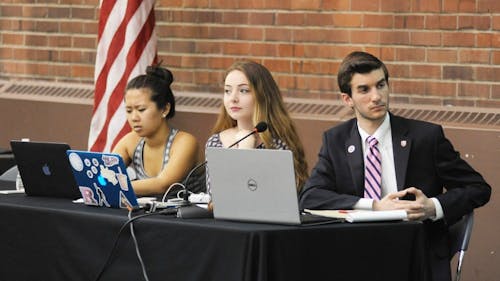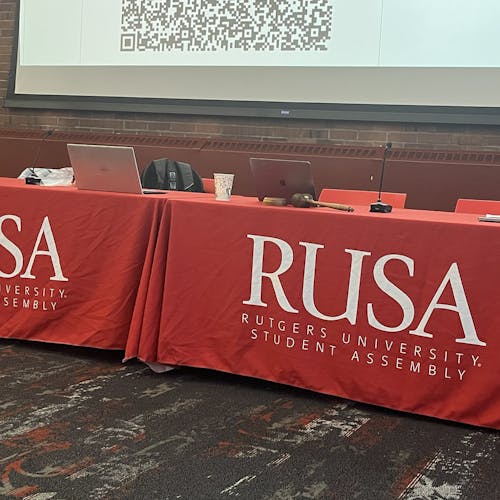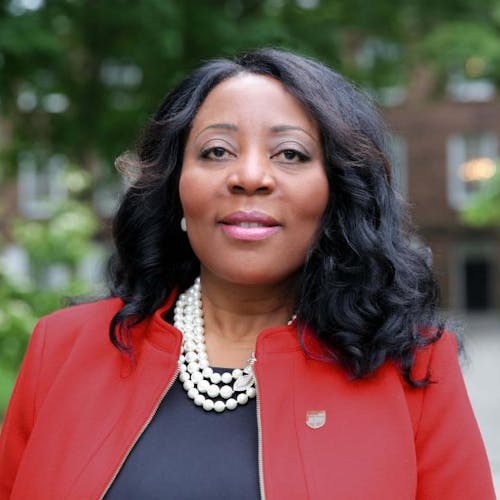RUSA resolution will require University funded organizations to complete bystander intervention training

At last night’s weekly Rutgers University Student Assembly (RUSA) meeting, the body passed a resolution to foster a culture of active bystanders on campus.
The resolution, which will go into effect September 2018, will require student organizations that receive $1,000 or more in funding from RUSA Allocations to have at least two of their officers complete bystander intervention training.
The training will be carried out by the Office of Violence Prevention and Victim Assistance (VPVA), and the logistics of the resolution’s implementation will be tasked to the Sexual Assault Prevention Committee, an entity of RUSA that addresses sexual violence.
Viktor Krapivin, an off-campus senator for RUSA, played a key role in the formulating of this new legislation, which he said was modeled after a similar bystander intervention program implemented at the University of Michigan.
“It’s important to create a culture on campus that supports intervening in precarious situations,” said the School of Arts and Sciences junior. “If there are more active bystanders, it’s possible that a lot of things won’t happen, and active bystanders are what VPVA thinks can help change the tide of the issue on campus.”
Krapivin has gone through bystander intervention training himself and said that it was a very empowering experience.
One in five women experiences some sort of sexual assault in their lifetime, he said. These rates presumably apply to Rutgers, and it is important to take a stand in decreasing that number.
“As the student representative in the University community, it’s our job to change that. By creating a culture on campus where our student leaders are trained in how to be active bystanders, we are creating a culture where our leaders have the character of being able to step in at the right times and making sure that sexual assaults don’t happen on our campus,” Krapivin said.
Since this legislation will not take effect until 2018, RUSA and its involved subdivisions will be able to prepare thoroughly for it and ensure that all student organizations who are affected understand the ruling and have sufficient time to prepare as well, he said.
Krapivin said that the reason RUSA is only applying this legislation to organizations that receive at least $1,000 in funding rather than simply all organizations is to allow the plan to be implemented in a more methodical and effective manner.
The hope is that a future body will gain the ability to make this training mandatory for all student organizations, he said.
Christie Schweighardt, vice president of RUSA and a School of Arts and Sciences junior, has attended meetings with leaders of the VPVA to discuss this training.
“It’s important that this legislation passed because ensuring that students are bystander intervention trained ensures that when we are out at a party, or out anywhere on campus, that more students know what to do and know how to step in and help other students,” she said.
Officers of clubs are role models for the other members of their organization, and Schweighardt said that by receiving this training and demonstrating its importance, they can inspire more people to do the same.
Many students are unaware of how to act in situations of possible sexual violence, she said.
“One of the biggest problems with sexual assault or dating violence is that people see it happening, they just don’t know how to step in,” Schweighardt said. “They’re scared, they don’t know what to do, they don’t know if they’re overstepping boundaries, they don’t know what to say or who to call. So going through this training lets people know exactly what you can do in a situation.”
She said that the training will occur in six-hour sessions, and that SCREAM Theater will play a supplemental role in the education.
RUSA is looking into increasing their effectiveness in terms of anti-sexual violence legislation by creating a Sexual Violence Prevention Department within the Assembly.
“We’ve all seen it. We’ve all seen it when walking home,” Schweighardt said. “But if we know what to do about it then we can change the culture.”



